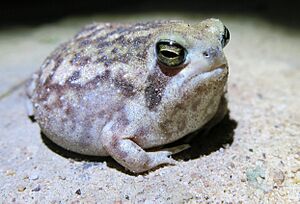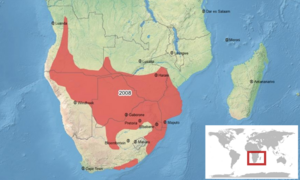Common rain frog facts for kids
Quick facts for kids Common rain frog |
|
|---|---|
 |
|
| Breviceps adspersus, Limpopo, South Africa. | |
| Conservation status | |
| Scientific classification |
|
| Kingdom: | Animalia |
| Phylum: | Chordata |
| Class: | Amphibia |
| Order: | Anura |
| Family: | Brevicipitidae |
| Genus: | Breviceps |
| Species: |
B. adspersus
|
| Binomial name | |
| Breviceps adspersus Peters, 1882
|
|
 |
|
| Script error: The function "autoWithCaption" does not exist. | |
| Synonyms | |
|
|
Script error: No such module "Check for conflicting parameters".
The Common Rain Frog (scientific name: Breviceps adspersus) is a unique type of frog. It's also known as the Bushveld Rain Frog and by other local names. This special frog belongs to the Brevicipitidae family. You can find it in many parts of Southern Africa, including countries like Angola, Democratic Republic of the Congo, Namibia, Botswana, Zambia, Zimbabwe, South Africa, Eswatini, and Mozambique.
About the Common Rain Frog
The Common Rain Frog has a brownish-green color. It has a very round body and short, thick legs. Unlike most frogs, it cannot jump or swim!
Male rain frogs are usually about 30 to 47 millimeters long. Females are a bit bigger, growing to about 40 to 60 millimeters.
There are two main types, or subspecies, of the Common Rain Frog. These are Breviceps adspersus adspersus and Breviceps adspersus pentheri. The B. adspersus adspersus type is found more in the northern parts of its range. The B. adspersus pentheri type lives in the southern areas. Scientists tell them apart by their different colors and markings.
Where They Live and What They Do
Common Rain Frogs live in warm forests and open grasslands. You can find them in the southeastern parts of Africa.
During the dry winter months, these frogs hide away. They dig burrows (underground tunnels) to stay safe and cool. After it rains, they come out, usually at night. This is when they look for food and find a mate.
Their diet mainly consists of small insects. They love to eat termites, ants, and other tiny creatures without backbones. The number of Common Rain Frogs is steady. They are considered "locally common," meaning you can find many of them in certain areas.
How They Reproduce
Mating for the Common Rain Frog is quite interesting! Male frogs are too small to hold onto the female during mating, like many other frogs do. So, the male releases a special sticky "glue." This glue helps the male and female stay stuck together.
Once they are joined, the pair burrows backward into the soil. They dig down until they reach a special chamber. The female has already dug this chamber about 30 centimeters (about 12 inches) below the ground. Inside this underground room, the female lays her eggs.
What's really cool is that these eggs don't hatch into tadpoles. Instead, they hatch directly into tiny froglets! This means they skip the tadpole stage that most frogs go through.
 | Calvin Brent |
 | Walter T. Bailey |
 | Martha Cassell Thompson |
 | Alberta Jeannette Cassell |


